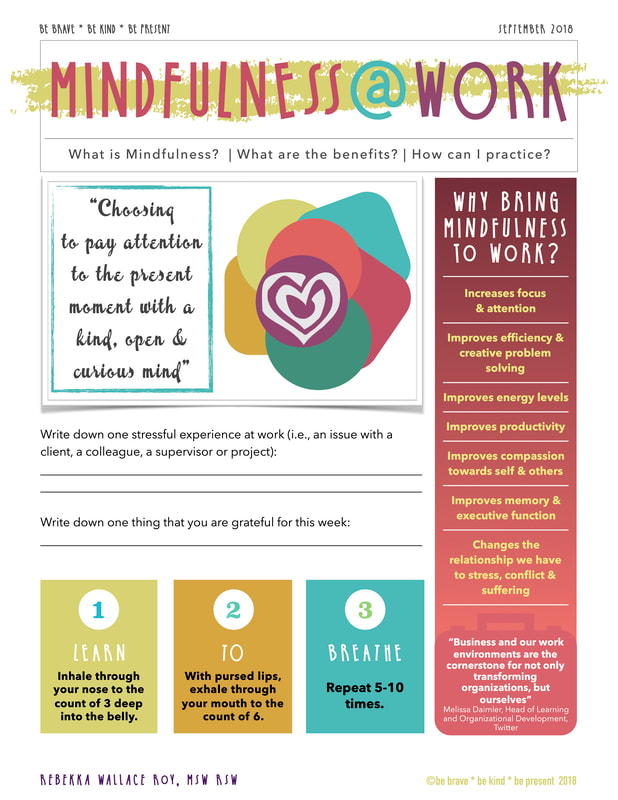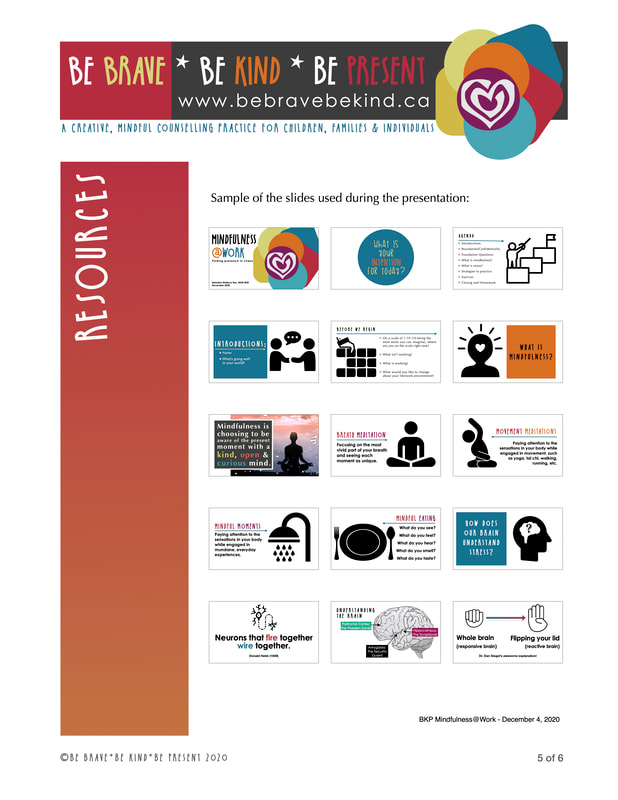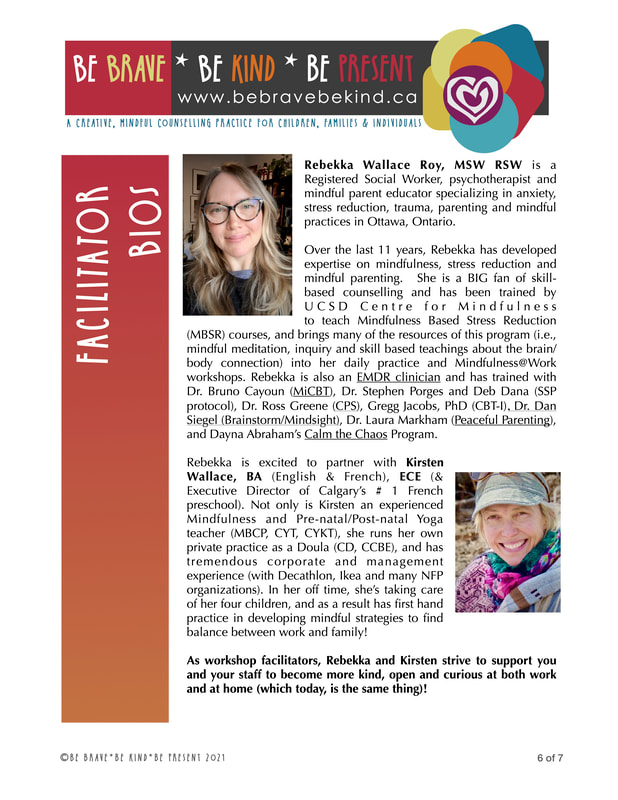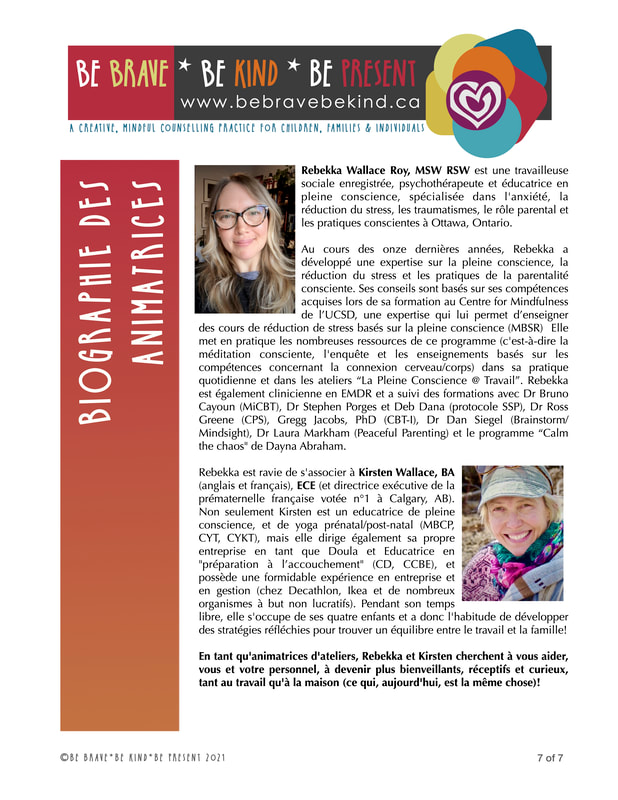Why bring mindfulness to the workplace?
Objectives
Goals
1) Be introduced to Mindfulness.
2) Learn basic mindful breathing skills.
3) Practice mindful eating.
4) Learn and practice Mindful movements and exercises that can be done during the day, at your desk!
5) Explore evidenced based strategies for stress and anxiety reduction.
6) Be provided online resources in class to facilitate ongoing growth and mindful balance.
- Since 2018, Rebekka provides 1-hour weekly meditation/mindfulness classes for the Seniors residing in the Rivera Living Retirement (Colonel By Retirement home).
- Environment Canada (EC) offered our 2 part Mindfulness@Work workshop three times to accommodate their ~30 staff. They also had us come in and do a 2 part workshop for their directors/managers.
- IRCC chose to keep the 3 part Mindful Parenting workshop open to all staff (~40 members attended). We will be coming back in the fall for more workshops!
- Another EC group ran the 2 part Mindfulness@Work workshop and then had us come in to facilitate three individual 1-hour workshops (Mindful parenting, Mindful Moments, and Mindful Movements).
- We recently taught a 1.5-hour Mindful Parenting Workshop in Webinar format for the Ottawa Public Library. 80+ participants were live via zoom and Facebook live. We’re also teaching a virtual Mindfulness for Kids and Teens workshop for Mental health Awareness Month!
- CPCS, an international private consulting group, had us teach a 1-hour Mindfulness@Work session for their staff (70 participants). It was recorded and they have included this as part of their company's mental health resources. This was Rebekka’s 2nd time teaching at CPCS.
- One EC group had Rebekka attend a virtual 30-minute meditation/grounding practice prior to a Diversity training.
- TIPES (Thinking in Pictures Educations Services) has hosted three, 4-week Mindful Parenting workshops, as well as a 4-week Mindfulness for Teens workshop for their families with Autistic and/or Neural Diverse families.
- Prior to Covid shutdowns:
- EC and Public Service ran 1-hour Mindfulness@Work Workshops in person.
- Coast Guard ran a 1-hour Mindfulness@Work workshop, a 1.5-hour Workshop and then a 7-week Mindfulness@Work series.
- Rebekka has provided multiple Mindful Parenting workshops in community and school settings.
- Both Rebekka and Kirsten have offered multiple 7-8 week-long Mindfulness-Based Stress Reduction (MBSR) and Mindfulness-Based Childbirth and Parenting (MBCP) workshops in both Ottawa and Calgary.
- Rebekka taught 30-minute Meditation classes for staff at Ottawa City Hall (volunteer).
- Rebekka taught a 5-week Mindfulness in the Classroom workshop for Hopewell Ave Public school (now taught virtually).
- EC and Public Service ran 1-hour Mindfulness@Work Workshops in person.
Now in both FRENCH and English!
Mindfulness @Work
Bringing a culture of mindfulness to your work space can increase productivity, improve the emotional wellness of your staff / colleagues, and reduce their experiences of stress. Rebekka and Kirsten provide customizable workshops that are catered to fit the needs of your team. These interactive workshops involve mindful exercises, group discussions, and opportunities to develop concrete plans to implement mindful practices in their daily life.
These workshops are offered in both French & English, upon demand.
Details:
Each participant will receive a small survey prior to the day that asks about their stresses and current self-care practices. I then create the workshop around this information. However, the basic structure of the workshops are the same:
1 hour workshop includes:
1) What is mindfulness?
2) Mindful Eating (practice)
3) Connecting body to mind (brains!)
4) Learning to breathe (short sitting meditation practice)
5) Evidenced based strategies to bring mindfulness to the office (discussion of informal and formal practice)
6) Lots of laughter and discussion
7) Comprehensive colour handout (pdf)
2 (or 3) x 1 hour workshops include:
1) What is mindfulness?
2) Mindful Eating (practice)
3) Connecting body to mind (brains!)
4) Learning to breathe (short sitting meditation practice)
5) Introduction and practice of walking meditation
6) Introduction and practice of mindful movement meditation
7) Strategies to bring mindfulness to the office and at home (discussion of informal and formal practice)
8) Lots of laughter and discussion
9) Finishing off session with gratitude teachings.
10) Comprehensive colour handout (pdf)
8 week Mindfulness for Stressed Out Folks Program includes:
1) Orientation (1 hour)
2) 8 Weekly Classes, 1.5 hours
3) Comprehensive handout (pdf), meditation recordings & laminated supplies
4) All-Day Retreat, 5.5 hours
5) 8-25 people
Week 1: Introduction to mindfulness and mindfulness-based skills - awareness and presence
Week 2: Role of perception in shaping our reality, learning to be with ALL experiences.
Week 3: Being vs doing mode
Week 4: Stress and stress reactivity - awareness of workplace stress patterns
Week 5. Responding to stress vs reacting to stress
Week 6: Challenging communication with our family, partners and colleagues
Week 7: Bringing what we are learning into action!
Week 8: Keeping mindfulness alive in our day to day life.
**Please contact Rebekka at [email protected] for prices**
Learn to Breathe... Again
This 1.5 hour workshop explores the basics of meditation and the ways we can incorporate mindfulness into a daily, soul filling practice.
This evidenced based practice has been shown to help children and adults change their relationship to stress and suffering, as well as improve their focus and concentration, facilitate emotional regulation, develop compassion to self and others, and ameliorate social relationships (Harpin, Rossi, Kim, & Swanson, 2016).
At its very core, mindfulness invites us to "choose to pay attention to the present moment with a kind, open and curious mind". It encourages us to set an intention to focus on the here & now, and become authentically interested in the physical, emotional and behavioural sensations of both body and mind. It offers us a new lens through which we can see suffering, anxiety and stress, without judgement and without expectation.
By bringing kindness, openness and curiosity into the picture, we begin to see the rich textures of suffering; and in doing so, suffering shifts from being something horribly done to us, to something we can witness, breathe into and ultimately respond to with thoughtfulness and compassion!
This workshop introduces participants to the world of mindfulness using simple meditation practices that can be done anywhere and everywhere. To learn more about mindfulness, please check out my page: https://bebravebekind.ca/mindfulness--mindful-parenting.html
Workshop includes:
1) What is mindfulness?
2) Mindful Eating (practice)
3) Connecting body to mind (brains!)
4) Learning to breathe (short sitting meditation practice)
5) Strategies to practice intentional mindfulness every day (discussion of informal and formal practice)
6) Lots of laughter and discussion
7) Comprehensive colour handout, laminated tools and calming jar ($20/person value) for max 15 people
$500/hour (+HST)
** Please note that refunds are available, minus a $50 service/admin charge. **
Safe & Sound Protocol
*** The fee for the SSP is $550. Please email Rebekka at [email protected] to see if we are a good fit and to see if the SSP is a good choice for you at this time. Please note that I am only registered to work with clients in Ontario at this time.***
Safe & Sound Protocol (SSP):
The SSP uses the auditory system (how we hear) and its connection to the nervous system (how we feel) to establish the brain and body’s ability to find states of calm, safety, and regulation. I use SSP as a complimentary resource for therapy. Please note that this is NOT a stand-alone therapy. It opens us up, stabilizes and prepares the nervous system to do the hard work of therapy and growth.
The Background Details
The SSP is a 5 hour, evidenced-based, non-invasive treatment to help one regulate their nervous system (and improve social engagement, as well as physical and emotional regulation). It was created to reduce stress and anxiety using filtered music that exercises and challenges middle ear muscles).
The music is composed of altered vocal music (i.e., filtered). It is specially adapted to use the auditory pathway to access the neural network that manages autonomic nervous system regulation. For more information on how this works, please see page one of this document or visit: “Nourish and awaken the nervous system. Feel better. Think better. Connect better.”
This therapy is most successful when accompanied by other therapies, such as psychotherapy, occupational therapy or somatic experience therapy.
How is it done?
Over ten or more days, you will listen to the filtered music offered via the Unyte-ILS app (provided to you by Rebekka). This is done in 5-10 minute increments (to a maximum of 30 minutes/day). The length of time depends on how your nervous system manages the music.
While listening to the music helps to engage in a relaxing activity, such as colouring, stretching, puzzles, crafting (knitting, etc.). It is essential that you use over-the-ear headphones (that are not soundproof) and that you can keep the volume as low as is comfortable (and do not change it while listening). Not to worry, you will test the volume before each session.
While it is suggested that we do this over ten consecutive days, we work from a “less is more” policy. That means that if you’re feeling dysregulated or overwhelmed while listening to the music, it’s time for us to take a break. This is a Safe before Sound protocol, and it’s essential that you feel grounded before and throughout much of your session for us to maximize success!
Given the small increments of time (5-30 minutes), working with Rebekka will not always be possible, and you will be listening to the music on your own at your convenience. However, to ensure that you’re feeling comfortable with the SSP at first, we will listen to the first hour together, as well as the third and possibly the fourth hour. However, if you feel like you’d be more comfortable working together throughout, we will develop a program that works for both of us.
The people behind it:
The Safe and Sound Protocol, or SSP, is an evidenced-based, non-invasive application of Polyvagal Theory. It’s based on years of research and was created by Dr. Stephen Porges. With the help of Deb Dana (LCSW), Dr. Liz Charles, and some other incredible clinicians, Dr. Porges created a tool that supports social workers, psychotherapists, psychologists and occupational therapists in helping their clients find their inner calm.
We use modulated vocal and classical music to strengthen the neural network related to listening and this incredible nerve (the vagus nerve). Our vagus nerve (which, fun fact, means wanderer in Latin) is responsible for your body’s “rest, regulation, connection, and social engagement.” It also links the body to the brain!
When our vagus nerve is working well, we can regulate our thinking and feeling, and soften our sensations of stress, overwhelm and anxiety! However, when our vagus nerve is out of sorts, our body can’t regulate, and we can experience BIG emotions, misread cues, and have heightened experiences of stress, overwhelm and anxiety!
This video has a great description of SSP and how it works: https://videopress.com/v/W93gM786.
The SSP also uses“three pathways” to connect to a person’s nervous system: Connect, Core and Balance. Each has its unique approach, but the way we offer it is the same, through specially chosen, modulated music! It sounds odd, I agree! But these “pathways” have the power to restore our ability to find out calm!
Can it be any music?
Unfortunately no! Each pathway has ways to connect to the nervous system and does different things. This information is taken from https://integratedlistening.com/wp-content/uploads/2021/02/ssp-three-pathways.pdf.
Connect:
“SSP Connect is unfiltered music. We offer this as an introduction to clients to familiarize themselves with the SSP protocol.
Core:
This is the original SSP that was released in March 2017. Used by tens of thousands of clients, this filtered music program reduces stress and auditory sensitivity by restoring connections to the nervous system!
Balance:
“SSP Balance was developed as a follow up to the SSP Core to offer an opportunity to return to music as a calming and grounding experience with a less strenuous neural workout. The music in SSP Balance uses the same playlists as SSP Core but is treated to present the frequency envelope of the human voice with a narrower and less dynamic modulation around this range. It should feel like less of an exercise program than SSP Core and more of a re-experiencing of the cues of safety your client will remember from SSP Core.” (Unyte-iLs, 2021)
Who benefits from SSP?
When I started exploring this option as a therapeutic tool for my clients, I was told that anyone with a nervous system (aka EVERYONE) could benefit. And truthfully, I agree. However, it’s particularly fantastic for folks working through: anxiety, trauma, super-sensitive hearing, inattention, BIG behaviours/emotions, challenges with communication and even sets the stage for folks wanting to get into therapy but need some grounding before they dive in. Some folks have even found that it works well for chronic pain, hormonal dysregulation and issues with digestion!
What if I have a significant trauma history?
Trauma has a significant impact on one’s nervous system. Many would argue that the experience of trauma IS a dysregulated nervous system. We might choose only to do the SSP in session together (and not on our own) to ensure safety. Again, this is a case-by-case situation, and I want my clients to feel safe and supported throughout the entire journey (that means before SSP, during SSP and after SSP).
What if my world is stressful?
Then this may not be the time for us to do this. Ideally, you’re in an okay space to manage your mental health as the SSP is a powerful tool that can increase your symptoms during and for the first 2-to 3 weeks following treatment. Adding increased stress to your nervous system can 1) make you feel like it’s not working, 2) become demotivating to keep going (SSP is a little like finishing antibiotic treatment, once started, it’s helpful to finish), and 3) take away from the potential success of the tool!
What is involved in getting started?
Reading and understanding this entire document is a great start! Once we have explored if SSP is right for you, Rebekka will provide you with a few intake forms to help identify different nervous system issues. This includes a Sensory Intake form, A questionnaire and a pre/post-test (to see if there are shifts in your day-to-day world).
What is the app?
The Unyte-iLs app is free and easily downloadable. Rebekka will send you an invite and provide you with permissions for the program that best fits you! To know more about the playlists, please check out the attachments at the end of this document.
How do I know if it’s working?
We’ll be tracking things as we go. There is also a pre/post-test that evaluates issues going in and how they have shifted throughout and at the end of the treatment. Please see the attached Pre/Post-test attached to this document.
What are the risks?
I found that my concussion symptoms picked up on “Hour 3”. Some of my clients experienced heightened behaviours on hours 3, 4 & 5. Is this normal? Absolutely! We’re shifting and restoring a nervous system, so releases are bound to happen. Other side effects that you might see:
Clumsiness
Ringing in the ears (Tinnitus)
Diarrhea or gastrointestinal issues
Irritability and Explosiveness
Increased aggression
Changes in the menstrual cycle
Headaches (tension)
BIG emotion swings (lots of crying or frustration)
Increased anxiety
Fatigue or sleep disturbances
Heightened sensitivity to sound/light/emotions/sensations
Vivid nightmares/dreams
Blurred vision
Feeling spaced out / brain fog
Heart palpitations
Dizziness
No improvement.
Is SSP Immediate?
Like all good things, SSP takes time. It’s not a quick fix and works best alongside other therapies! We can expect changes to occur 2-7 weeks after treatment, and sometimes clients will repeat the therapy 2-3 more times, depending on the situation.
How much does it cost?
At this time, I’m offering the SSP for $550 (which is covered under Social Work psychotherapy if you have extended medical insurance in ONTARIO). This price includes:
- 3 hours of therapeutic supervision broken into four 30-45 minutes sessions for hours 1 and 3 of the 5 hour SSP
- Subscription for 30 days of the SSP Unyte-iLs app, which will allow you to listen at home for hours 2, 4 & 5 (depending on individual needs).
- Once the listening is completed, we will also have one session to complete the evaluation and final assessment (and a plan for going forward).
Full refunds are available prior to the service; however, there is a $33 admin/service charge to process online refunds.
Types of features that can benefit from the SSP
Trauma and anxiety, auditory hypersensitivity, inattention, behavioural dysregulation, difficulty with social communication, preparation for therapy.
What to notice about your child’s experience with SSP
Client share their stories:
A frightened adult feels calmer and gains courage
A young client recently diagnosed with autism
A child with autism and reduced auditory hypersensitivity and increased social engagement
What is Polyvagal Theory?
Steve Porges describes Polyvagal Theory:
Video 1 Video 2
Deb Dana describes Polyvagal Theory
6 Short Video Summaries: Dr. Stephen Porges Explains Polyvagal Theory and Applications
Relevant Blogs:
https://integratedlistening.com/blog/2017/09/20/better-access-executive-cognitive-functions-ssp/
https://integratedlistening.com/ssp-research/
https://integratedlistening.com/blog/2018/10/12/neurobites-how-to-answer-how-are-you/
https://integratedlistening.com/ssp-safe-sound-protocol-clinical-resources/
https://integratedlistening.com/blog/2018/03/19/neurobites-detection-of-threat-and-safety/
https://integratedlistening.com/blog/2016/06/14/face-face-interactions-social-engagement-system/
https://integratedlistening.com/blog/2017/03/12/vagus-what-happens-here-affects-everything/
https://integratedlistening.com/blog/2016/03/12/neurobites-heart-rate-variability/
Podcast library:
What past participants are saying!
- So accessible. So much information. So kind and welcoming. Met us where we're at in a million little ways”
- “Just finished watching (took me 3 days to digest the gold in bite size pieces) so am still enamored and have no suggestions.”
- “it's a big help to regulate me so I can approach my child as a better role model and that will help a lot. Thank you agin.”
- “Please distribute as wide as you can!”
- “Positive energy! Repeated points like showing the bottle and releasing, Yes tone, connection. Started with a short mindfulness exercise, and stretched us mid way. Really great!”
- “How you put together so many ideas that we've encountered and put them into small, manageable ideas. I feel like I can shift. Your graphics are really beautiful too. And I like your tone :)”
- “I really enjoyed that the sessions were interactive - having 2 animators (and siblings!) made it all the more interesting. Also really liked that we did not rush through concepts, but got many useful tips.”
- “Merci d'avoir fait les méditations et exercices en français!!”
- “je me suis sentie comprise et contente d'avoir des nouveaux outils pour m’aider a gérer mon stresse”
- “Practising the tools learned (meditation) and learning different techniques”
- “Rebekka est top Qu’avez-vous apprécié le plus dans l’atelier ?”
- “The openness of the speakers. Shared resources online. Interactive aspect.”
- “Over the last 2 years, TIPES has co-hosted 4 Mindful Parenting Sessions and a Teen Mindfulness Session in partnership with B Brave Be Kind. Rebekka works in a client centred, collaborative way and we received extremely positive feedback from our participants. Rebekka shared resources and tools that were helpful, easy to understand and engaging. We look forward to working with you again soon!”



